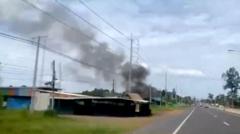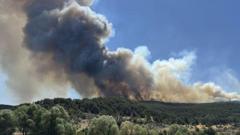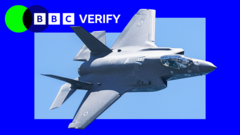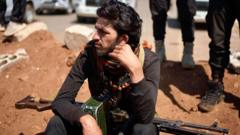Fierce clashes along the disputed Thailand-Cambodia border have resulted in a tragic loss of life, with at least 12 confirmed fatalities, according to Thai officials. The conflict, ignited by longstanding territorial disputes, predominantly involves civilian casualties, prompting both nations to evacuate residents from border areas.
Tensions Surge as Border Clashes Claim 12 Lives in Thailand-Cambodia Dispute

Tensions Surge as Border Clashes Claim 12 Lives in Thailand-Cambodia Dispute
Military confrontations at the Thailand-Cambodia border escalate, leaving at least twelve dead and sparking international concern.
As martial tensions rise, the conflict highlights historical grievances rooted in colonial-era border delineations, with the most recent flare-up linked to disputed military actions near a sacred temple site. Joint military operations have been exchanged amidst claims of violations and escalatory moves from both sides. With local residents fleeing the increasing violence, the international community closely monitors the potential for broader ramifications.
Thai authorities have stated that the majority of casualties—11 civilians including two minors and one military personnel—have been reported in the provinces of Surin, Ubon Ratchathani, and Srisaket. The confrontation began early Thursday when both armies exchanged gunfire, each accusing the other of instigating aggression. Thailand claims that Cambodia employed drones for surveillance, while Cambodian officials assert that Thai forces breached an agreement by advancing near a culturally significant temple.
This dispute can be traced back over a century, originating from border agreements established post-French colonial rule in Cambodia. Tensions escalated significantly in 2008 following Cambodia's attempt to register a temple within the disputed territory as a UNESCO World Heritage Site, a move that provoked a strong backlash from Thailand, leading to repeated military skirmishes in subsequent years.
More recently, tensions were rekindled following the killing of a Cambodian soldier in May, resulting in a significant chilling of diplomatic relations. In light of these conflicts, both nations have heightened military presence along the border and instituted trade restrictions, with Cambodia banning imports from Thailand.
Current political landscapes have left both nations with leadership struggling to navigate the crisis effectively. While Thai acting Prime Minister Phumtham Wechayachai suggests a need for diplomatic resolution within the bounds of international law, Cambodian Prime Minister Hun Manet maintains a hardline stance advocating for armed response if necessary.
Despite these precarious circumstances, it appears that full-scale war remains unlikely, yet both nations grapple with internal political challenges that complicate de-escalation efforts. As both sides call for caution, the region remains on high alert amidst this ongoing situation, with international observers advocating for a peaceful resolution to this volatile standoff.
Thai authorities have stated that the majority of casualties—11 civilians including two minors and one military personnel—have been reported in the provinces of Surin, Ubon Ratchathani, and Srisaket. The confrontation began early Thursday when both armies exchanged gunfire, each accusing the other of instigating aggression. Thailand claims that Cambodia employed drones for surveillance, while Cambodian officials assert that Thai forces breached an agreement by advancing near a culturally significant temple.
This dispute can be traced back over a century, originating from border agreements established post-French colonial rule in Cambodia. Tensions escalated significantly in 2008 following Cambodia's attempt to register a temple within the disputed territory as a UNESCO World Heritage Site, a move that provoked a strong backlash from Thailand, leading to repeated military skirmishes in subsequent years.
More recently, tensions were rekindled following the killing of a Cambodian soldier in May, resulting in a significant chilling of diplomatic relations. In light of these conflicts, both nations have heightened military presence along the border and instituted trade restrictions, with Cambodia banning imports from Thailand.
Current political landscapes have left both nations with leadership struggling to navigate the crisis effectively. While Thai acting Prime Minister Phumtham Wechayachai suggests a need for diplomatic resolution within the bounds of international law, Cambodian Prime Minister Hun Manet maintains a hardline stance advocating for armed response if necessary.
Despite these precarious circumstances, it appears that full-scale war remains unlikely, yet both nations grapple with internal political challenges that complicate de-escalation efforts. As both sides call for caution, the region remains on high alert amidst this ongoing situation, with international observers advocating for a peaceful resolution to this volatile standoff.




















